Recycling Case Studies
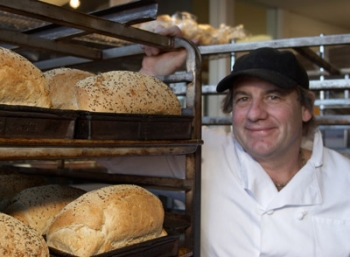
StopWaste has helped hundreds of organizations in over 45 different industries lower their operating costs and protect the environment. Learn about a few of our recycling assistance success stories from the case studies below.

Peerless Coffee & Tea Company in Oakland purchased computerized packaging equipment to reduce expensive Mylar packaging waste, previously generated by their coffee bagging equipment. This waste prevention effort has resulted in savings of over $100,000 annually.
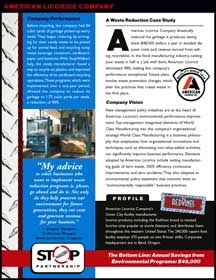
StopWaste helped food manufacturer American Licorice purchase a spiral dryer that prevents the creation of 150 tons of candy-waste a year. Through this and a variety of other measures, the company has reduced waste by 98%, saving $48,000 a year.

Bayer’s pharmaceutical division adopted a company-wide environmental policy and implemented a model recycling and data management program.
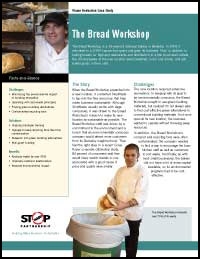
This artisanal bakery in Berkeley relocated and grew its business. Green building materials and techniques were used during building renovations. The move presented an opportunity to set up composting and recycling programs that have reduced waste by over 95%.
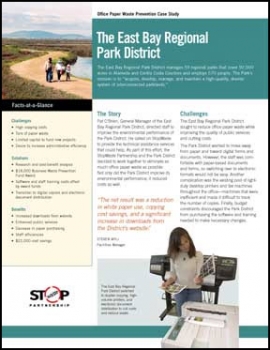
Duplex copying, high-volume printers, and electronic document distribution cut labor and copying costs by $22,000 a year, and prevent 11 tons of paper waste annually at this public agency’s administrative headquarters in Oakland.
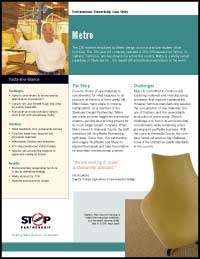
Metro (now Coalesse) makes furniture using wood feedstock from sustainable sources, recycled and recyclable materials, water-borne finishes and adhesives, and VOC-free powder-coat metal finishes. Among several waste reduction measures, the installation of cardboard and plastic film balers net $52,000 each year.

(NUMMI): This former Fremont-based auto manufacturer saved $2.5 million a year with reusable shipping containers. Note: NUMMI was among the first StopWaste clients to be profiled. The case study is still relevant today.

The Coliseum Complex wanted the best waste reduction program in the big leagues. Providing $20,000 in grant funding and free technical assistance, StopWaste has helped the Coliseum become the first major league sporting venue to use and recover compostable cups instead of plastic.
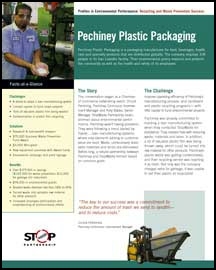
By increasing the efficiency of their manufacturing process, Pechiney (now Bemis Company Inc.) has reduced plastic film consumption by 150 tons a year, saving the company $165,000 annually. An excellent recycling program saves an additional $12,000 each year. Pechiney took advantage of three StopWaste funding options and earned over $78,000 in grants.

Pleasanton Corporate Commons, a multi-tenant office complex, received LEED-EB Silver certification (Leadership in Energy and Environmental Design for Existing Buildings), and saves $110,000 a year on disposal costs—all by implementing a new recycling program.
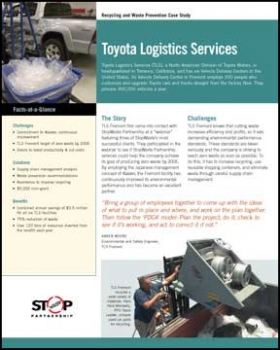
This former Fremont facility cuts costs by more than $27,000 and reduced waste by 120 tons a year with reusable shipping containers, careful supply chain management, and expanded recycling. Note: Toyota Logistics Services was among the first StopWaste clients to be profiled. The case study is still relevant today.
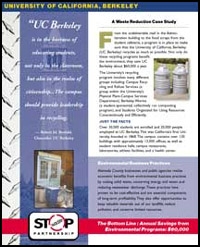
From undeliverable mail in the Administration building to food scraps from the cafeteria, UC Berkeley recycles as much as possible. The bottom line: savings of $60,000 annually. Note: UC Berkeley was among the first StopWaste clients to be profiled. The case study is still relevant today.

Improved landscape composting operations and a new on-site food scrap composting system have helped this college in Hayward cut garbage disposal costs by $7,500 a year, and save $2,500 annually on soil amendment.
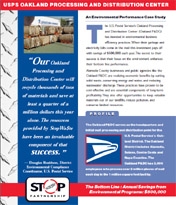
The United States Postal Service’s massive Oakland Processing and Distribution Center uses reusable containers to prevent waste and recycles undeliverable mail, paper, cardboard, bottles, cans, plastic film, pallets, and other materials, saving $200,000 per year.